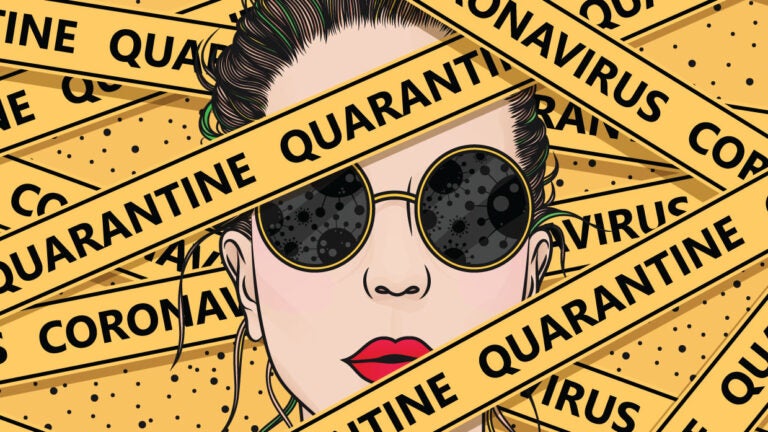
Some Americans have been protesting to reopen the country or having difficulty staying away from public areas, like beaches. (Illustration/iStock)
Why nature, history and American culture all make social isolation difficult
USC experts explain why some people are suffering from extreme lockdown fatigue: it’s a mix of human nature and an American identity that chafes at being “controlled.”
As some business and political leaders urge lifting closures that check the spread of coronavirus, California beaches and parks have become a battleground as the weather warms and summer nears.
But the controversy has roots deeper than political or economic interests — social isolation is mentally and emotionally taxing. USC experts say you can blame lockdown fatigue on American culture, the California lifestyle or just plain human nature.
“Isolation is not healthy for us. People have a strong need to bond with other people; it’s important for our mental health,” said Jonas Kaplan, assistant professor of psychology at the USC Dornsife College of Letters, Arts and Sciences and a cognitive neuroscientist at USC’s Brain and Creativity Institute.
The human need for connecting with other humans is rooted in our psychology and evolution.
Our brains are wired to seek human interaction, including subconscious behaviors to promote bonds, Kaplan explained. For example, the brain sparks unconscious behaviors and body language to promote connections between people. And while Zoom and other social media platforms help overcome isolation, they are inadequate surrogates for real contact, he said.
One of the very top things that make us human is being social.
Craig Stanford
But how did we get this way? The answer lies in our ancestral past, said Craig Stanford, chairman of the anthropology department at USC Dornsife and researcher of primate and human societies. He sees parallels.
“Being in social groups is central to us as a species for as long as we’ve been a species,” he said. “One of the very top things that make us human is being social.”
Most mammals are solitary, but social behavior is ingrained in primate societies and was passed along to human societies. Humans evolved while deriving great benefits from socialization, including the development of hunting and survival skills, which were passed on to children, and political skills, said Stanford, co-director at USC’s Jane Goodall Research Center.
“One of the worst things we can do to someone is to isolate them or exile them. There’s an unhealthy element to it, no matter how we explain it,” he said.
To help people cope, Stanford advocates nixing the term “social distancing” in favor of physical distancing, which is what’s really needed to protect against coronavirus.
Though Californias value the outdoors, ending social isolation means increasing risk
Other forces contribute to lockdown fatigue. There are values rooted in our culture that chafe against restrictions.
In California, the most populous state, many of the nearly 40 million who live here enjoy the weather and lifestyle. Outdoor recreation, arts, sports and live events are embedded in the state’s social fabric. Southern California beaches have become flashpoints as thousands of people, encouraged by local officials, visit the coast despite warnings from Gov. Gavin Newsom.
“As the weather gets warmer, it’s going to be hard to keep people indoors and away from the beach and the California outdoor lifestyle,” said Kaplan, who is also co-director of the Dornsife Neuroimaging Center.
But health experts warn that even the broad expanses of beaches are not really safe. There are many ways people interact at the beach that are too close for comfort in a time of coronavirus, said Paula Cannon, professor of microbiology and immunology of the Keck School of Medicine of USC.
For example, at the beach, people converge at access points such as sidewalks and paths. They share indoor restrooms. Children mingle over sandcastles at the water’s edge. People can become infected and not even know it, taking the disease home to friends and families, Cannon explained.
“There is no zero risk for COVID-19 infection,” she said. “Just because it seems safe doesn’t mean it is safe. Just because you, or people you know, are not sick doesn’t mean it’s safe. The virus is still there.”
American identity can lead to being flummoxed by forces beyond our control
Other cultural forces cause Americans to chafe at restrictions. They transcend the economic losses suffered by the world’s biggest economy.
Alison Dundes Renteln, professor of political science at USC Dornsife, said that coronavirus challenges the concepts of American exceptionalism and individual liberty.
Now nature, and the coronavirus, control us when we are used to conquering nature.
Alison Dundes Renteln
“America’s national identity is about political freedom. Our identity is we don’t stay still long, we go conquer things, like the American conquest of the wilderness,” said Renteln, an expert on U.S. political culture, constitutional law and human rights. “But now nature, and the coronavirus, control us when we are used to conquering nature, so it goes against the grain and is contrary to American mythology.”
Americans tend to share a worldview that is future-focused, energetic, youthful and prefers happy endings, which doesn’t jibe with pandemic-driven lockdowns and social isolation, Renteln noted.
But Cannon — an expert on COVID-19, HIV, Ebola and other viruses — warns that a virus has its own behaviors to ensure its survival and spread.
“It’s simple math: If more people go out, people increase their risk of being infected, and nature will return the favor and have more people infected,” she said. “If people act as individuals, versus what one should do as a member of our community, it can undermine the hard work we’ve done to control the spread of the virus.”



